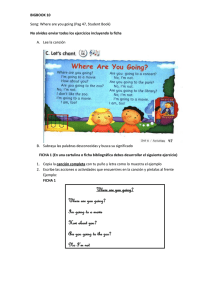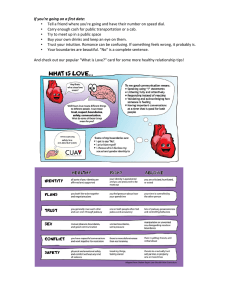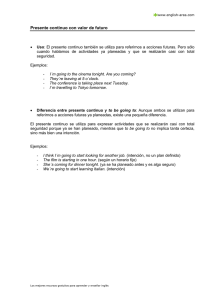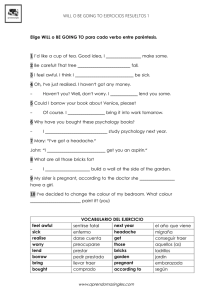SESIÓN 6 FORMAS DE FUTURO Y LOS AUXILIARES MODALES I
Anuncio
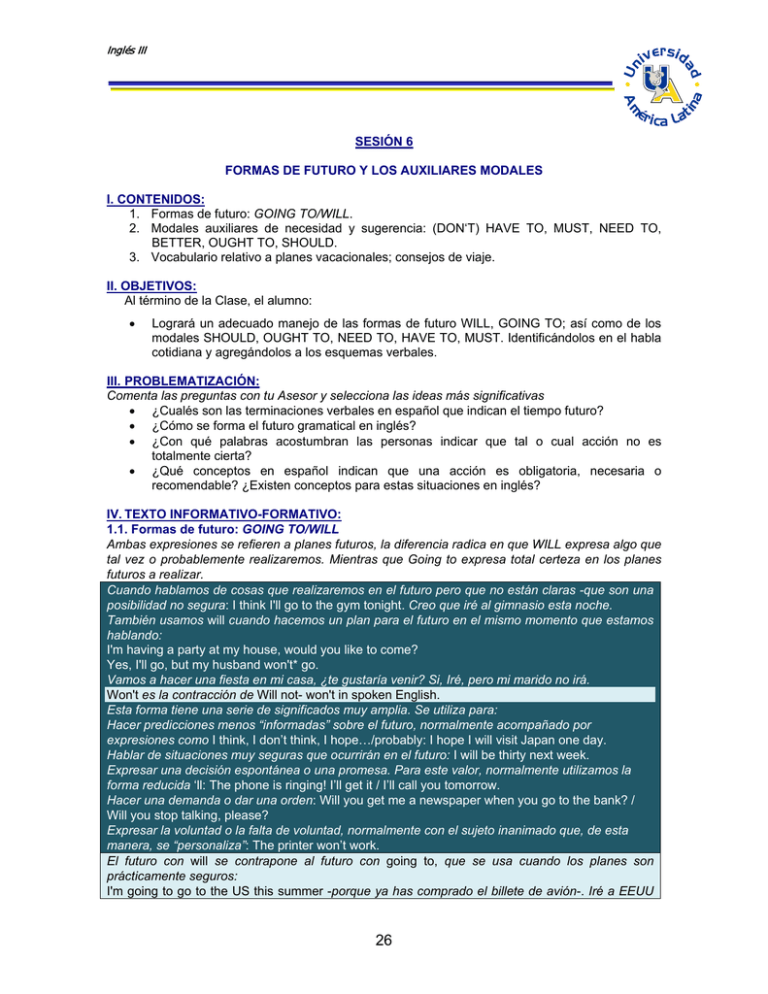
Inglés III SESIÓN 6 FORMAS DE FUTURO Y LOS AUXILIARES MODALES I. CONTENIDOS: 1. Formas de futuro: GOING TO/WILL. 2. Modales auxiliares de necesidad y sugerencia: (DON‘T) HAVE TO, MUST, NEED TO, BETTER, OUGHT TO, SHOULD. 3. Vocabulario relativo a planes vacacionales; consejos de viaje. II. OBJETIVOS: Al término de la Clase, el alumno: • Logrará un adecuado manejo de las formas de futuro WILL, GOING TO; así como de los modales SHOULD, OUGHT TO, NEED TO, HAVE TO, MUST. Identificándolos en el habla cotidiana y agregándolos a los esquemas verbales. III. PROBLEMATIZACIÓN: Comenta las preguntas con tu Asesor y selecciona las ideas más significativas • ¿Cualés son las terminaciones verbales en español que indican el tiempo futuro? • ¿Cómo se forma el futuro gramatical en inglés? • ¿Con qué palabras acostumbran las personas indicar que tal o cual acción no es totalmente cierta? • ¿Qué conceptos en español indican que una acción es obligatoria, necesaria o recomendable? ¿Existen conceptos para estas situaciones en inglés? IV. TEXTO INFORMATIVO-FORMATIVO: 1.1. Formas de futuro: GOING TO/WILL Ambas expresiones se refieren a planes futuros, la diferencia radica en que WILL expresa algo que tal vez o probablemente realizaremos. Mientras que Going to expresa total certeza en los planes futuros a realizar. Cuando hablamos de cosas que realizaremos en el futuro pero que no están claras -que son una posibilidad no segura: I think I'll go to the gym tonight. Creo que iré al gimnasio esta noche. También usamos will cuando hacemos un plan para el futuro en el mismo momento que estamos hablando: I'm having a party at my house, would you like to come? Yes, I'll go, but my husband won't* go. Vamos a hacer una fiesta en mi casa, ¿te gustaría venir? Si, Iré, pero mi marido no irá. Won't es la contracción de Will not- won't in spoken English. Esta forma tiene una serie de significados muy amplia. Se utiliza para: Hacer predicciones menos “informadas” sobre el futuro, normalmente acompañado por expresiones como I think, I don’t think, I hope…/probably: I hope I will visit Japan one day. Hablar de situaciones muy seguras que ocurrirán en el futuro: I will be thirty next week. Expresar una decisión espontánea o una promesa. Para este valor, normalmente utilizamos la forma reducida ‘ll: The phone is ringing! I’ll get it / I’ll call you tomorrow. Hacer una demanda o dar una orden: Will you get me a newspaper when you go to the bank? / Will you stop talking, please? Expresar la voluntad o la falta de voluntad, normalmente con el sujeto inanimado que, de esta manera, se “personaliza”: The printer won’t work. El futuro con will se contrapone al futuro con going to, que se usa cuando los planes son prácticamente seguros: I'm going to go to the US this summer -porque ya has comprado el billete de avión-. Iré a EEUU 26 Inglés III este verano. It looks like it's going to rain -porque se oyen truenos. Parece que va a llover. Going to – Se utiliza para hablar de: Decisiones e intenciones: I’m going to stop smoking. Predicciones informadas con un alto grado de fiabilidad, normalmente basadas en alguna evidencia: She’s going to have a baby in the summer. El futuro en el pasado -future in the past-: Last time I saw you, you were going to take up a job in the City. La estructura gramatical en forma positive de going to es: noun + to be + going to + infinitive. Noun Verb to be Going to Infinitive I am dance going to He / She / It is study We / You / They are go shopping Paty’s going to travel this weekend Paty viajará este fin de semana. We’re going to go to a very expensive mall Iremos a un centro comercial muy caro. I’m going to come to school late Llegaré tarde a la escuela La estructura gramatical en forma negative es: noun + ver to be + not +going to + infinitive. Noun Verb to be + not Going to Infinitive I Am not clean going to He / She / It is not / isn’t cook We / You / They are not / aren’t travel I’m not going to go to work today Hoy, no iré a trabajar. Juan isn’t going to the party Juan, no irá a la fiesta. They aren’t going to stay at that house Ellos, no se van a quedar en esa casa. La estrucutura gramatical en forma interrogative es: question word + verb to be + noun + going to + infinite. Question word Verb to be Noun Going to Infinitive What am I do? going to Where is he / she / it go? ------------------are we / you / they travel? What are you going to do today? I’m going to go to work. What is she going to play? She’s going to play tennis. Are they going to attend the meeting? Yes, they are. No, they aren’t. Where is Karen going to study? She’s goin to study in UAL. En la siguiente tabla se pueden observer una serie de ejemplos de estas dos formas de futuro: Going to Will I’m going to visit Italy next summer I’ll stay home this vacation Visitaré Italia el próximo verano Estaré en casa estas vacaciones Claudia is gonig to take karate lesson this week Claudia will choose which sport to practice Claudia tomará lecciones de karate esta semana Claudia escogerá cual deporte practicar He’s going to do camping this weekend Maybe Alberto will take care of his mother at the hospital Quizás Alberto cuidará de su El acampará este fin de semana madre en el hospital Maria and Karla aren’t going to ski at Mount They probably won’t visit China on December Everest Probablemente, ellas, no visitarán China en María y Karla no esquiarán en el Monte Everest diciembre Gloria and you aren’t going to wathch the new I guess we won’t watch his new movie 27 Inglés III Antonio Banderas’ movie Gloria y tu no verán la nueva película de Antonio Banderas Are you going to book at Carmina Palace Hotel? ¿Resevarán en el Hotel Carmina Palace? What are you going to do this vacation? ¿Qué vas a hacer estas vacaciones? Supongo, que nosotras no veremos su nueva película Do you think my brother and his wife will have a honeymoon? ¿Piensas que mi hermano y su esposa tandrán su luna de miel? What will you plan for the summer? ¿Qué planearás para el verano? 2.1. Modales auxiliares de necesidad y sugerencia: (DON‘T) HAVE TO, MUST, NEED TO, BETTER, OUGHT TO, SHOULD Los auxiliaries de modo nos permiten expresar. Habilidad, permiso, posibilidad, certeza, necesidad u obligacion HAVE TO – Tener que We’re very busy at the office. I have to work on Saturday mornnig Nosotros estamos muy ocupados en la oficina. Yo tengo que trabajar el sábado por la mañana Mark has to get the car repaired. There’s something wrong with the brakes. Mark tiene que llevar el auto a reparar. Hay algo malo con los frenos. *Utilizamos have to cuando una stuacion hace algo necesario u obligatorio. I have to exercise. (The doctor told me) – Yo tengo que ejercitarme. (El doctor me lo dijo) We have to be quiet. (That’s the rule) – Nosotros tenemos que estar callados (Esa es la regla) MUST – Deber You’ll be leaving college son. You must think about your future. Tu saldrás de la universidad pronto. Debes pensar en tu futuro. *Utilizamos must cuando el hablante siente que algo es necesario. You must be quiet – Tu debes estar callado. You must exercise – Tu debes ejercitarte. I must buy the newspaper. I want to see the racing results. Yo debo comprar el periodico. Quiero ver los resultados de la carrera. We must invite Claire. She’s a wonderful company. Nosotros debemos invitar a Claire. Ella es una maravillosa compañía. Should, ought to and had better – Debería A: Maybe you should ask for your money back. B: They ought to make these things a bit easier for you C: I’d better read the instructions again. A: Quizá tu deberías pedir que te regresen tu dinero. B: Ellos deberían hacer éstas cosas un poco más fáciles para ti. C: Deberíamos leer las instrucciones otra vez. *Utilizamos should y ought to para expresar que es la mejor opción de hacer algo correctamente. Y no existe diferencia en significado: You’re not very well. Perhaps you should see a doctor Tu no estas muy bien. Quizas deberías ver a un doctor Your uncle was verty kind to me. I ought to write him a letter of thanks. Tu tio fue muy amable conmigo. Yo debería escribirle una carta de agradecimiento a él *Usamos had better cuando decimos que algo es lo mejor por hacer en una situación: My wife is waiting for me. I’d better not be late. Mi esposa esta esperándome. Yo no debería llegar tarde. 28 Inglés III The neighbors are complaining. We´d better turn the music down. Los vecinos se están quejando. Nosotros deberíamos apagar la música. *Podemos utilizar should or ought to en los ejercicios anteriores, sin embargo had better es más fuerte. El espectador mira la acción tanto como sea necesario y espera lo que pasará. 3.1. Vocabulario relativo a planes vacacionales; consejos de viaje Admission fee accomodation costo de la entrada brochure camping site, campsite folleto car rental car hire alquiler de autos caravan car park casa rodante, rulot, caravana city centre double room centro de la ciudad cruise double room with twin crucero beds downtown flight centro de la ciudad package deal parking lot paquete resort return ticket lugar de vacaciones round ticket season viaje redondo sightseeing tour single ticket visita con guía single room sightseer habitación simple ski resort sun lotion estación de esquí sunglasses sunblock gafas de sol sunburn theme park quemadura de sol time-sharing tour operator tiempo compartido tourist office travel agency oficina de turismo travel agent vacation agente de viajes voyage waiting list viaje (en barco o nave espacial) youth hostel to book albergue juvenil to confirm to drive confirmar to fly to go on holiday, volar vacation to go abroad to go camping irse al extranjero to go climbing to go hiking ir a escalar fortnight guesthouse quincena guide hiking trail holidaymaker hotel inn to go mountaineering to go skiing to go to the beach to have a good time to make a reservation guía Sendero de caminata veraneante, turista hotel posada hacer alpinismo high season holidays ir a esquiar ir a la playa pasarlo bien reservar to go swimming to have a bad time to hold a reservation to rent a car hostel hotel chain low season to go sightseeing 29 alojamiento sitio para acampar alquiler de autos estacionamiento habitación doble habitación doble con dos camas vuelo estacionamiento viaje de ida y vuelta temporada viaje de ida turista, excursionista bronceador filtro solar parque de diversiones empresa de viajes agencia de viajes vacaciones lista de espera reservar conducir irse de vacaciones ir de camping ir a dar una caminata casa de huéspedes, pensión temporada alta vacaciones hostal cadena de hoteles temporada baja visitar lugares de interés ir a nadar pasarlo mal mantener una reserva alquilar un auto Inglés III to plan to stay organizar permanecer Más vocabulario sobre viajes: Customs Aduana Hostel Albergue Single ticket Boleto de ida Travel bag Bolsa de viaje Traveler's check Cheque de viaje Papers Documentación to sunbathe to take a photograph Equipaje Equipaje permitido Exceso de equipaje Excursionista Fonda; Posada Guía (grupo turistas) Habitación doble Horario Hotel de primera, segunda, tercera Llegada Luggage Baggage allowance Baggage excess Tripper Inn Guide; Courier Double room Timetable First, second, third class hotel Arrival Mapa Media pensión Oficina de objetos perdidos Pasajero Pensión Permiso internacional de conduccir Sala de espera Seguro de viajes Tarjeta de identidad Turismo Viajante; Viajero Map Half board Lost property office Agencia de viajes Boleto Boleto de regreso Carrito de equipajes Destino Documentación del automóvil Equipaje de mano Estancia Excursión Gira Frontera Guía (libro) Habitación individual Hotel de lujo Itinerario Maleta Máquina expendedora de billetes Oficina de información Parador Pasaporte Passenger Boarding-house International driving license Waiting room Travel insurance Identity card Tourism Traveller Pensión completa Retraso Reserva Ruta Salida Taquilla Tienda de campaña Turista Viaje tomar sol tomar una fotografía Travel agency Ticket Return ticket Luggage trolley Destination Car's documents Full board Delay Reservation Route Departure Ticket office Tent Tourist Journey; Trip Hand luggage Stay Outing Tour Frontier; Border Guidebook Single room Luxury hotel Itinerary Suitcase Ticket machine Information office State-run hotel Passport Preguntas y frases que apoyan el vocabulario anterior: - Excuse me, how much is the single/return/round trip ticket to Manchester? - How much is the city tour? - The itinerary will begin in Guanajuato and it will last 5 days. The tour will visit wonderful places. - Total cost including fares, accommodation and all meals, excursions and local taxes: 320 Dlls. - You will visit one of the most beautiful cathedrals in the world. - We are going to sleep in a camp-site - Are you going to hitch hike? 30
